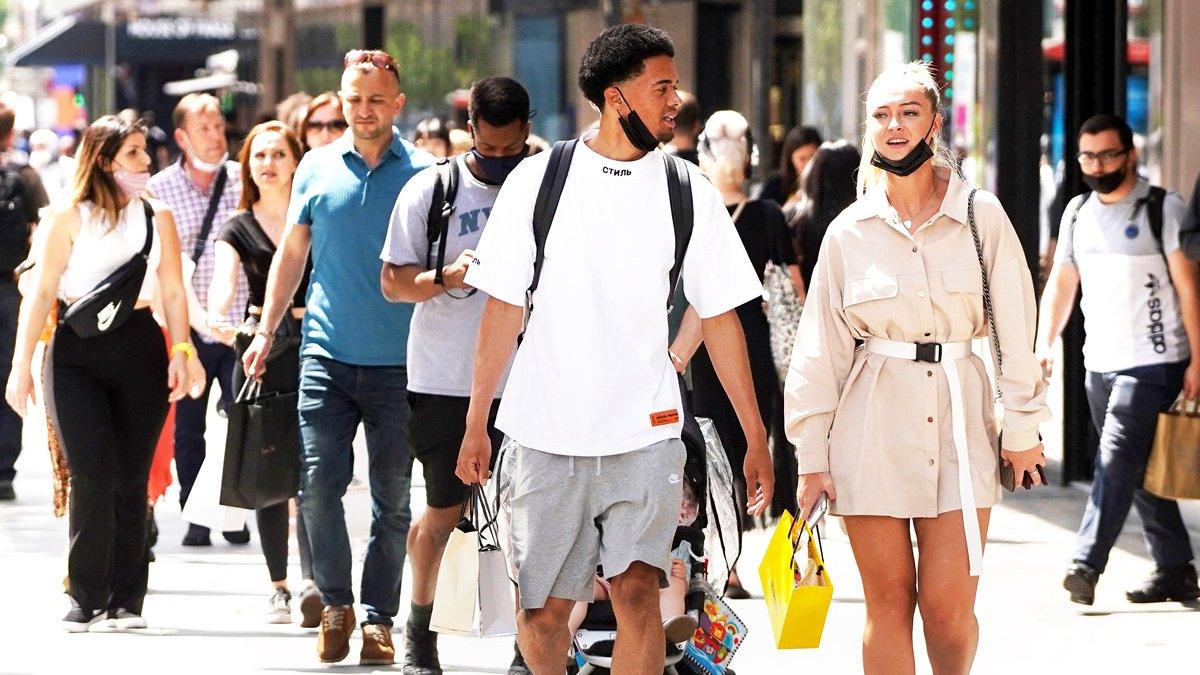Covid: Final decision on 21 June easing not taken yet, Boris Johnson says
- Published
"The crucial thing that we set out in the four tests that we set at the outset.... is the link between transmission of the virus" - Dominic Raab
A final decision on whether to lift Covid restrictions in England on 21 June has not yet been taken, Boris Johnson has said ahead of an announcement on Monday.
It comes after Foreign Secretary Dominic Raab said "we don't want to yo-yo in and out of measures".
One scientist advising the government said easing more rules would "fan the flames" of rising infections.
The BBC has been told a delay of up to four weeks is being considered.
Asked at a G7 press conference about plans to ease lockdown measures, the prime minister said: "We are continuing to look at the data, no final decision has been taken, and the right time to fill everybody in on what we are going to do with step four with June 21 is tomorrow, as I have said.
"That's when we will be putting out the whole package of information so that everyone can see it together."
Mr Raab said the decision would depend on whether the link between infections and hospital admissions had been severed.
The foreign secretary told the BBC's Andrew Marr Show: "The crucial thing that we set out in the four tests that we set at the outset of the road map is the link between transmission of the virus, and then the variants, and hospitalisations."
He said the country had made "great progress in weakening the link".
But he added: "The question is whether we have severed and broken it. We are looking at the data in real time."
"The race we're in is to get everyone as quickly as we can up to two doses," he said, adding that this maximises the effectiveness in preventing serious illness and stopping transmission of the virus.
He stressed that the roadmap out of lockdown said that stage four - when all legal restrictions on social contact are due to be lifted - was due no earlier than 21 June.
If stage four went ahead, nightclubs would also be allowed to reopen and there would be no limits on numbers for theatres, sports events and wedding guests.
With 90% of infections in the UK now due to the Delta variant, first identified in India, Dr Jeffrey Barrett at the Wellcome Sanger Institute said a "major part" of why the UK is facing a growing wave of cases is because hundreds of infections were brought in from abroad in April.
But Mr Raab denied the government had acted too slowly to prevent the variant being introduced to the UK, saying: "We've got a system where we get flagged variants of concern and we take action when we get that advice."
On Sunday, the UK recorded 7,490 new cases of Covid-19 and eight deaths within 28 days of a positive test.
Professor Andrew Hayward: "If we were to open up more, that will just really fan the flames"
Prof Andrew Hayward from University College London, who is a member of the Sage group which advises the government, said it was "clear" the UK would have "a substantial third wave of infections".
"The really big question is how much that wave of infections is going to translate into hospitalisations," he told the Andrew Marr Show.
He said the suggestion that the Delta variant was 60% more transmissible was "extremely worrying" and added there was still a "substantial chance" there could be a wave of hospital admissions that would put significant pressure on the NHS.

Infections in the UK are doubling every one or two weeks, depending on the region, Prof Hayward said. He said the UK is only "three or four doubling times" from reaching the same peak of infections as the second wave in January.
Labour's Emily Thornberry said tomorrow's decision about the 21 June reopening was "the last chance" for the government to follow the science and communicate clearly with the public.
She said: "This is the last push and we need to make sure it's done properly. The weak link is government ministers not making decisions fast enough and not communicating them properly."

"I'VE KEPT ALL THIS PAIN BOTTLED UP": Joey Essex explores the trauma of losing his mum
SNOWFALL SERIES FOUR: The beginnings of the crack epidemic in 1980s LA

- Published12 June 2021

- Published12 June 2021

- Published9 June 2021

- Published11 June 2021